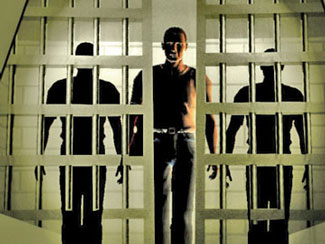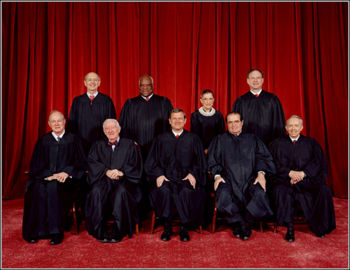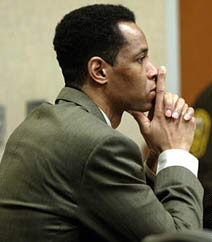Spiritual Incarceration
 Friday, December 7, 2007 at 10:17AM
Friday, December 7, 2007 at 10:17AM  “Where the Spirit of the Lord is, there is liberty.” 2 Corinthians 3:17
“Where the Spirit of the Lord is, there is liberty.” 2 Corinthians 3:17
The glass door to the church office had not yet closed behind him when he stuck his hand out to me. “Pastor, I’m a free man.” His haggard, but relieved, expression accented his words. It wasn’t the shame of incarceration or the anger at the justice system that dominated his emotion. After a three month lock-up, it was obvious that nothing was more important to him than simply to regain his freedom.
But, why do we imprison people? Over the centuries, the purpose of imprisonment has gone from justice, to punishment, to correction, to reform, to rehabilitation, to protecting society from offenders. In the United States today, the crime rate is lower than it has been for a number of years. At the same time, the prison population is at an all time high, suggesting that when the bad guys are locked up, the crime rate indeed goes down. The following paragraphs explain what people believe who are familiar with the correctional system today:
“As a society, we have chosen to prioritize the public safety of our citizens over programs designed to enhance the personal growth of inmates. Bear in mind that most, if not all, rehabilitation programs offered in our prisons were also available to them before their incarceration. All states provide tax-supported programs to benefit their citizens — be it academic and/or remedial education, vocational skills training, and chemical abuse, psychological, and/or psychiatric treatment. Every inmate had the opportunity to avail themselves of any or all of these programs before their incarceration. Every inmate made a choice — to drop out of school, to join a gang, to drink, to use drugs, to commit a crime. Just like everyone else — whether you’re a CEO , a shift worker or a homemaker — every inmate must acknowledge and accept the consequences of their choices and decisions.” Dianna Clemons, President, Justice For All
“Most of us, while growing up, learned that human life was sacred, and that murder is the most profound injustice. We learned that the courtroom was the place to search for truth and that justice would prevail. In ‘What Murder Leaves Behind,’ Doug Magee says, ‘In the aftermath of murder, families need some sense of counterbalancing justice. Exactly what that justice might entail differs from survivor to survivor, but all agree that they expect a realistic expression of regret and concern from the criminal justice system.’ All too often, this is not forthcoming. For the ultimate crime of murder, society must have the courage to take a stand, denounce the act as abhorrent, vow not to tolerate it and follow through with a tough sentence. The murderer deserves to be segregated from society, not only as a penalty (punishment) but for the safety of the rest of us. Perhaps convicted murderers could be rehabilitated to be constructive within the prison environment. My personal opinion (and that of many survivors) is that violent offenders should not be shown leniency.” Jean Lewis, Member of Board of Parents of Murdered Children
It seems quite obvious to me that the most practical purpose for incarceration is to keep criminals away from an open society so they will not hurt themselves or anyone else. Unfortunately, some people exist who simply cannot be trusted to behave themselves. They do not have enough control over their actions to be permitted to live side-by-side with their fellow citizens. We have a reasonable expectation that citizens in a free society should impose their own internal restraints upon themselves. Those who cannot refrain from deliberately injuring others around them must have external restraints imposed upon them. This means jail. Whether or not punishment is served, or rehabilitation occurs, has no bearing on the intended goal of incarceration. Once a person becomes a part of the correctional system, their fate and/or reform progresses according to a different set of criteria than the purpose for the initial lock-up.
Two conditions must exist for society to enjoy a viable existence: 1) it must incarcerate offenders; and 2) individual citizens must embrace societal norms for themselves. If we didn’t have prisons, anarchy would prevail and we would return to the wild west. At least for these elemental reasons, I think most of us would agree that we ought to have prisons for lawbreakers. Yet, the Bible also has an interesting point of view for prisoners.
Isaiah 42:5-7 Thus saith God the Lord, he that created the heavens, and stretched them out; he that spread forth the earth, and that which cometh out of it; he that giveth breath unto the people upon it, and spirit to them that walk therein: I the Lord have called thee in righteousness, and will hold thine hand, and will keep thee, and give thee for a covenant of the people, for a light of the Gentiles; To open the blind eyes, to bring out the prisoners from the prison, and them that sit in darkness out of the prison house.
Ps 142:5-7 I cried unto thee, O Lord: I said, Thou art my refuge and my portion in the land of the living. Attend unto my cry; for I am brought very low: deliver me from my persecutors; for they are stronger than I. Bring my soul out of prison, that I may praise thy name: the righteous shall compass me about; for thou shalt deal bountifully with me.
How can Bible-believing citizens in our society favor prisons when the very Bible to which they claim allegiance inveighs against it? Before we go too far, we should clarify the difference between incarceration in ancient times and that of today. In Bible days, people in prison were much more likely to be there for reasons other than committing violent crimes. Debtors prisons were common, as well as prisons for political enemies. So, what is this prison to which the above scriptures refer? Theses scriptures are metaphorical and they include the prison of sin, the prison of self-righteousness and the prison of their captors, such as the Babylonians, Assyrians, and the Medes and Persians. It also includes the prison of religion.
The Religion of Incarceration
Yes, I did say the prison of religion. The fact is that man has fashioned a prison out of the sacred and honorable trappings of religion. It is apparent that the Bible does not always hold religion in the most favorable light. Five reference to religion appear in the scripture:
“Which knew me from the beginning, if they would testify, that after the most straitest sect of our religion I lived a Pharisee.” Acts 26:5
“For ye have heard of my conversation in time past in the Jews’ religion, how that beyond measure I persecuted the church of God , and wasted it.” Galatians 1:13
“And profited in the Jews’ religion above many my equals in mine own nation, being more exceedingly zealous of the traditions of my fathers.” Galatians 1:14
“If any man among you seem to be religious, and bridleth not his tongue, but deceiveth his own heart, this man’s religion is vain.” James 1:26
“Pure religion and undefiled before God and the Father is this, To visit the fatherless and widows in their affliction, and to keep himself unspotted from the world.” James 1:27
Of these five references, one can reasonably assume that the Apostle Paul does not hold a positive view of religion. In fact, he admits that religion became the reason and impetus for persecuting the church. History buffs know that religion has killed more people throughout the ages than raw imperialism or hunger for power ever did (with the possible exception of Hitler’s holocaust and Stalin’s pogroms of genocide). James talks about vain religion, and then he defines pure religion as having two aspects: good works and a virtuous life. If there is pure religion, there must also be an impure religion. If not, then James would have only needed to use the word “religion” without the qualifier “pure.” This comes down to my overarching contention in this article: impure religion results from doing the right things for the wrong reasons.
Religion evolved into a kind of external restraint, a set of imposed beliefs to which its adherents were expected to conform. The Jewish religion, especially through the efforts of the sect of the Pharisees, suffered immeasurably from man’s propensity to codify everything. Nelson’s Bible Dictionary contains the following comments on the Pharisees:
“Pharisees observed the Law carefully as far as appearances went, but their hearts were far from God. Their motives were wrong because they wanted the praise of men (Matthew 6:2,5,16; 23:5-7). They also had evil desires that were hidden by their pious show (Matthew 23:25 -28). That is why Pharisees are often called hypocrites: their hearts did not match their outward appearance.
“The Pharisees thought they could match God’s standards by keeping all the outward rules. Luke 18:9 says they “trusted in themselves that they were righteous.” This can easily happen when people think God’s will is the same thing as their list of what they can and cannot do. Their desire to keep all of God’s laws was commendable, but sometimes they put the emphasis on the wrong places. Minor details became a major preoccupation, and they forgot the more important things (Matthew 23:23 ).
“Finally, because Pharisees thought they were doing their best to keep God’s laws while others were not, they often looked down on such “sinners”-especially people like tax collectors and prostitutes. Religious people need to remember that they, too, are sinners in God’s eyes, and that Christ died for everyone.” (from Nelson’s Illustrated Bible Dictionary, © 1986, Thomas Nelson Publishers)
The Pharisees represented the best and the worst of religion. For those who possessed a great respect and reverence for godliness, religion seemed to offer more than any other belief system. To those who obsessed on externals, however, Phariseeism became an insufferable measuring stick for judgmentalism and discrimination. Indeed, the Pharisees were so notorious for their odious self-righteousness that Jesus singled them out numerous times for condemnation.
“But woe unto you, scribes and Pharisees, hypocrites! for ye shut up the kingdom of heaven against men: for ye neither go in yourselves, neither suffer ye them that are entering to go in. Woe unto you, scribes and Pharisees, hypocrites! for ye devour widows’ houses, and for a pretence make long prayer: therefore ye shall receive the greater damnation. Woe unto you, scribes and Pharisees, hypocrites! for ye compass sea and land to make one proselyte, and when he is made, ye make him twofold more the child of hell than yourselves.” Matthew 23:13-15
“And the Lord said unto him, Now do ye Pharisees make clean the outside of the cup and the platter; but your inward part is full of ravening and wickedness. Ye fools, did not he that made that which is without make that which is within also? But rather give alms of such things as ye have; and, behold, all things are clean unto you. But woe unto you, Pharisees! for ye tithe mint and rue and all manner of herbs, and pass over judgment and the love of God: these ought ye to have done, and not to leave the other undone. Woe unto you, Pharisees! for ye love the uppermost seats in the synagogues, and greetings in the markets. Woe unto you, scribes and Pharisees, hypocrites! for ye are as graves which appear not, and the men that walk over them are not aware of them. Then answered one of the lawyers, and said unto him, Master, thus saying thou reproachest us also. And he said, Woe unto you also, ye lawyers! for ye lade men with burdens grievous to be borne, and ye yourselves touch not the burdens with one of your fingers. Woe unto you! for ye build the sepulchres of the prophets, and your fathers killed them. Truly ye bear witness that ye allow the deeds of your fathers: for they indeed killed them, and ye build their sepulchres. Therefore also said the wisdom of God, I will send them prophets and apostles, and some of them they shall slay and persecute.” Luke 11:39-49
The weight of this condemnation should resound loudly in our collective ears. The Apostolic church has always contended that Pentecost is not a religion, it is an experience. Yet, methodically and inexorably, we have kept at it until we have turned it into a religion, nonetheless. Many converts to the Apostolic church were born into a religion. It was a collection of rules, regulations, and beliefs that were imposed upon them. Some were baptized as infants or confirmed at a young age as more of a rite of passage than a heartfelt wish. These beliefs were not a product of a personal experience with God.
Herein lies the crux of the matter: Religion is imposed from the outside. Salvation comes from an internalized experience with God. Religion forces, salvation grows. Religion incarcerates, salvation liberates. Religion doubts the intents of the heart; salvation affirms the intents of the heart. Religion uses rules and regulations to control; salvation embraces rules and regulations as an expression of love to God. Religion needs no relationship with God to thrive or even survive; salvation utterly depends upon its relationship to God to survive. Religion monitors its own progress, checks itself against the prescribed rules and gets fueled by its own pride and self-motivation. Salvation needs the constantly abiding Christ, the engrafted Word and the indwelling Spirit. In the end, religion glorifies the adherent; salvation glorifies God.
Religion from the Heart
From its beginning, the Church of Jesus Christ held that each person had to have his or her own experience with God. Not only is this manifest from Old Testament prophets, it dominated the preaching and teaching philosophy of the New Testament church. Here is a sampling of the scriptures:
“A new heart also will I give you, and a new spirit will I put within you: and I will take away the stony heart out of your flesh, and I will give you an heart of flesh. And I will put my spirit within you, and cause you to walk in my statutes, and ye shall keep my judgments, and do them.” Ezekiel 36:26-27
“And when the day of Pentecost was fully come, they were all with one accord in one place. And suddenly there came a sound from heaven as of a rushing mighty wind, and it filled all the house where they were sitting. And there appeared unto them cloven tongues like as of fire, and it sat upon each of them. And they were all filled with the Holy Ghost, and began to speak with other tongues, as the Spirit gave them utterance.” Acts 2:1-4
“While Peter yet spake these words, the Holy Ghost fell on all them which heard the word. And they of the circumcision which believed were astonished, as many as came with Peter, because that on the Gentiles also was poured out the gift of the Holy Ghost. For they heard them speak with tongues, and magnify God. Then answered Peter, Can any man forbid water, that these should not be baptized, which have received the Holy Ghost as well as we? And he commanded them to be baptized in the name of the Lord. Then prayed they him to tarry certain days.” Acts 10:44-48
“And it came to pass, that, while Apollos was at Corinth , Paul having passed through the upper coasts came to Ephesus : and finding certain disciples, He said unto them, Have ye received the Holy Ghost since ye believed? And they said unto him, We have not so much as heard whether there be any Holy Ghost. And he said unto them, Unto what then were ye baptized? And they said, Unto John’s baptism. Then said Paul, John verily baptized with the baptism of repentance, saying unto the people, that they should believe on him which should come after him, that is, on Christ Jesus. When they heard this, they were baptized in the name of the Lord Jesus. And when Paul had laid his hands upon them, the Holy Ghost came on them; and they spake with tongues, and prophesied. And all the men were about twelve.” Acts 19:1-7
The emphasis on each individual receiving a personal Pentecost underscores the value of a relationship with God that is embraced, not imposed. Without an individual experience, one had a need to gravitate toward religion. This is because he or she has no internal motivating power. Little wonder then, that as the spiritual gifts waned in the later history of the early church, the need for religion grew stronger. Without Christ ruling from the heart, the church had to rule from the throne. That which was intended to be a servant of mankind became its cruel master. Instead of pastors becoming shepherds over souls, they became wardens of spiritual prisons. It’s not that the inmates of a prison live by a different standard of morality than those on the outside; it’s just that inmates would not live that way without maximum supervision. Free people on the outside live by that same standard of morality because their lives are governed by an internal respect for the rule of law. Same morality, different methods and motives. David understood this law of the inner man:
“The law of the Lord is perfect, converting the soul: the testimony of the Lord is sure, making wise the simple. The statutes of the Lord are right, rejoicing the heart: the commandment of the Lord is pure, enlightening the eyes. The fear of the Lord is clean, enduring for ever: the judgments of the Lord are true and righteous altogether. More to be desired are they than gold, yea, than much fine gold: sweeter also than honey and the honeycomb. Moreover by them is thy servant warned: and in keeping of them there is great reward. Who can understand his errors? cleanse thou me from secret faults. Keep back thy servant also from presumptuous sins; let them not have dominion over me: then shall I be upright, and I shall be innocent from the great transgression. Let the words of my mouth, and the meditation of my heart, be acceptable in thy sight, O Lord, my strength, and my redeemer.” Psalm 19
Nowhere in scripture do we find this concept spelled out so succinctly as in Romans 6. As you read it, pay special attention to the use of the phrase, “from the heart.” Paul knew all about the external religion, imposed by man. He saw through it. It was shallow, self-glorifying and cruel. His conversion to Christianity changed his observance of certain ceremonial regulations, but it did not change his morality. He continued to believe in righteousness, perhaps even more fervently than before. What did change was his motivating factor. The God above him became the God within him.
“Know ye not, that to whom ye yield yourselves servants to obey, his servants ye are to whom ye obey; whether of sin unto death, or of obedience unto righteousness? But God be thanked, that ye were the servants of sin, but ye have obeyed from the heart that form of doctrine which was delivered you. Being then made free from sin, ye became the servants of righteousness. I speak after the manner of men because of the infirmity of your flesh: for as ye have yielded your members servants to uncleanness and to iniquity unto iniquity; even so now yield your members servants to righteousness unto holiness. For when ye were the servants of sin, ye were free from righteousness. What fruit had ye then in those things whereof ye are now ashamed? for the end of those things is death. But now being made free from sin, and become servants to God, ye have your fruit unto holiness, and the end everlasting life. For the wages of sin is death; but the gift of God is eternal life through Jesus Christ our Lord. Romans 6:16-23
“Servants, be obedient to them that are your masters according to the flesh, with fear and trembling, in singleness of your heart, as unto Christ; Not with eyeservice, as menpleasers; but as the servants of Christ, doing the will of God from the heart; With good will doing service, as to the Lord, and not to men.” Ephesians 6:5-7
God’s plan is not for us to be incarcerated in a religion. It is for believers to embrace his righteousness, his holiness and his saving grace voluntarily, from their own hearts. The external rules and standards exist for definitions of truth and guidelines to living a holy life.
In summary, we must continue to believe, preach, teach and practice those forms of holiness that we find in the Scriptures. What we must lose is our tendency to turn the hallmarks of holiness into sledgehammers of condemnation. Problems with living righteously invariably stem from a flawed spiritual heart. The answer is not better prisons. The answer is a better relationship with God. If all we have is the ability to build prisons, we are doomed because the younger generation will always discover a new way to escape. If we lead them into embracing a secure relationship with God, they will find a permanence and stability in their lives that religion can never give them. Now, more than ever, it is time to love God from the heart.








